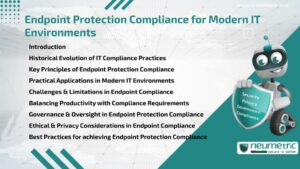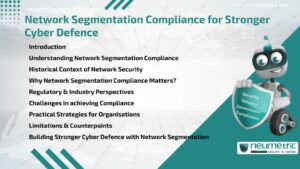Table of Contents
ToggleIntroduction
AI Model Security Compliance is a crucial Framework that ensures Artificial Intelligence systems operate safely, Ethically & Legally. It involves aligning models with established Security standards, Regulatory requirements & industry Best Practices to protect data, maintain Privacy & reduce Risks of misuse. As Organisations deploy AI across Healthcare, Finance, Government & Education, Compliance becomes central to maintaining Trust. Without it, Vulnerabilities could lead to Breaches, biased outcomes or reputational harm. This article explores what AI Model Security Compliance entails, why it matters, its challenges, benefits & Best Practices for safe AI deployment.
Understanding AI Model Security Compliance
AI Model Security Compliance refers to the set of Policies, Standards & Practices that safeguard AI Systems throughout their lifecycle. This includes Data Protection, model Integrity, Access Controls, Monitoring & Audit mechanisms. Just as a seatbelt ensures driver safety, Compliance frameworks ensure AI operates responsibly. It balances innovation with Accountability, ensuring that AI tools serve society without causing harm.
Historical Perspectives on AI & Security Standards
The concept of regulating technology is not new. Information Security standards such as ISO 27001 & frameworks like NIST Cybersecurity Framework were early efforts to govern digital safety. As AI matured, existing standards were adapted, but gaps remained. Unlike traditional software, AI Models learn & evolve, creating unique Compliance challenges. Historical lessons from Cybersecurity breaches & Data Privacy scandals highlight why dedicated AI Model Security Compliance is essential for modern deployments.
Key Components of AI Model Security Compliance
Compliance involves several core components:
- Data Governance: Protecting Sensitive Data from misuse.
- Model Transparency: Ensuring decision-making processes are explainable.
- Access Control: Preventing unauthorised use of AI Systems.
- Continuous Monitoring: Tracking AI behavior for anomalies.
- Audit Trails: Documenting system activities for Accountability.
Each element works like pieces of a lock & only when all are in place can Organisations ensure AI Systems are safe to deploy.
Practical Challenges in Implementing Compliance
Despite its importance, implementing AI Model Security Compliance is not without challenges. Organisations face difficulties in interpreting evolving regulations, managing costs & integrating Compliance into existing workflows. Small Businesses often lack resources, while larger enterprises struggle with the complexity of cross-border standards. Another hurdle is balancing Transparency with Intellectual Property protection, as exposing too much about a model could Risk competitive advantage.
Benefits of Strong Compliance Measures
Strong Compliance provides measurable benefits. It protects User Data, reduces liability Risks & builds public Trust. For sectors like Healthcare & Finance, Compliance is often a legal requirement, ensuring adherence to Privacy laws. It also strengthens resilience against Cyber Threats. Just as sturdy walls protect a castle, robust Compliance safeguards AI Systems from external & internal Risks.
Counter-Arguments & Limitations
Some argue that heavy compliance slows down innovation, increasing costs & administrative burdens. Others claim that Compliance frameworks are too rigid for rapidly evolving AI technologies. While these concerns hold weight, it is important to recognise that non-compliance carries far greater Risks, including Regulatory Penalties & Reputational damage. The challenge is striking a balance where Compliance does not stifle progress but encourages responsible innovation.
Real-World Applications of Compliance in AI Deployment
In practice, AI Model Security Compliance applies across industries. In Healthcare, it ensures Patient Data confidentiality under HIPAA. In Finance, Compliance supports Fraud Detection models that must follow strict Auditing rules. Governments deploy AI for public services under ethical oversight, ensuring Fairness & Security. These examples show that Compliance is not just a checklist but a safeguard for Trust & Safety.
Best Practices for Safe AI Deployment
Organisations can strengthen AI deployment by following Best Practices:
- Conducting regular Risk Assessments.
- Training staff in Compliance awareness.
- Implementing layered Security Controls.
- Aligning with Global Standards like ISO, NIST & GDPR.
- Engaging Third Party Audits for impartial validation.
By embedding Compliance from the start, Organisations create AI Systems that are Resilient, Ethical & safe for deployment.
Conclusion
AI Model Security Compliance is not optional but essential for safe AI deployment. It ensures systems are Secure, Ethical & aligned with Regulatory requirements. While challenges exist, the benefits of Compliance far outweigh the costs, making it a cornerstone of responsible AI adoption.
Takeaways
- AI Model Security Compliance protects users & Organisations alike.
- Compliance addresses data Governance, Transparency, Access, Monitoring & Audits.
- Strong Compliance improves trust, safety & resilience.
- Challenges include cost, complexity & evolving regulations.
- Best Practices help Organisations balance Compliance with innovation.
FAQ
What is AI Model Security Compliance?
It is a Framework of standards, Policies & Practices designed to ensure AI Systems operate securely, ethically & in line with regulations.
Why is AI Model Security Compliance important?
It reduces Risks of Data Breaches, ensures Fairness, builds Trust & protects Organisations from legal or reputational harm.
What industries benefit most from AI Model Security Compliance?
Industries such as Healthcare, Finance, Government & Education benefit greatly due to their handling of Sensitive Information.
Does Compliance slow down AI innovation?
It can add costs & oversight, but it also ensures responsible innovation by reducing Risks of harmful outcomes.
How does Compliance protect users?
It safeguards Sensitive Data, ensures fair decision-making & provides Accountability through Monitoring & Audits.
Can Small Businesses adopt AI Model Security Compliance?
Yes, though resource limitations may exist, adopting scaled frameworks & Third Party tools can help them achieve Compliance.
What role do Global Standards play in Compliance?
Global Standards like ISO, NIST & GDPR provide consistent guidelines for securing AI Systems across industries & borders.
Need help for Security, Privacy, Governance & VAPT?
Neumetric provides organisations the necessary help to achieve their Cybersecurity, Compliance, Governance, Privacy, Certifications & Pentesting needs.
Organisations & Businesses, specifically those which provide SaaS & AI Solutions in the Fintech, BFSI & other regulated sectors, usually need a Cybersecurity Partner for meeting & maintaining the ongoing Security & Privacy needs & requirements of their Enterprise Clients & Privacy conscious Customers.
SOC 2, ISO 27001, ISO 42001, NIST, HIPAA, HECVAT, EU GDPR are some of the Frameworks that are served by Fusion – a SaaS, multimodular, multitenant, centralised, automated, Cybersecurity & Compliance Management system.
Neumetric also provides Expert Services for technical security which covers VAPT for Web Applications, APIs, iOS & Android Mobile Apps, Security Testing for AWS & other Cloud Environments & Cloud Infrastructure & other similar scopes.
Reach out to us by Email or filling out the Contact Form…





